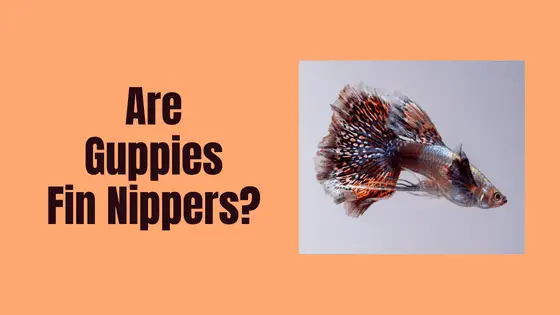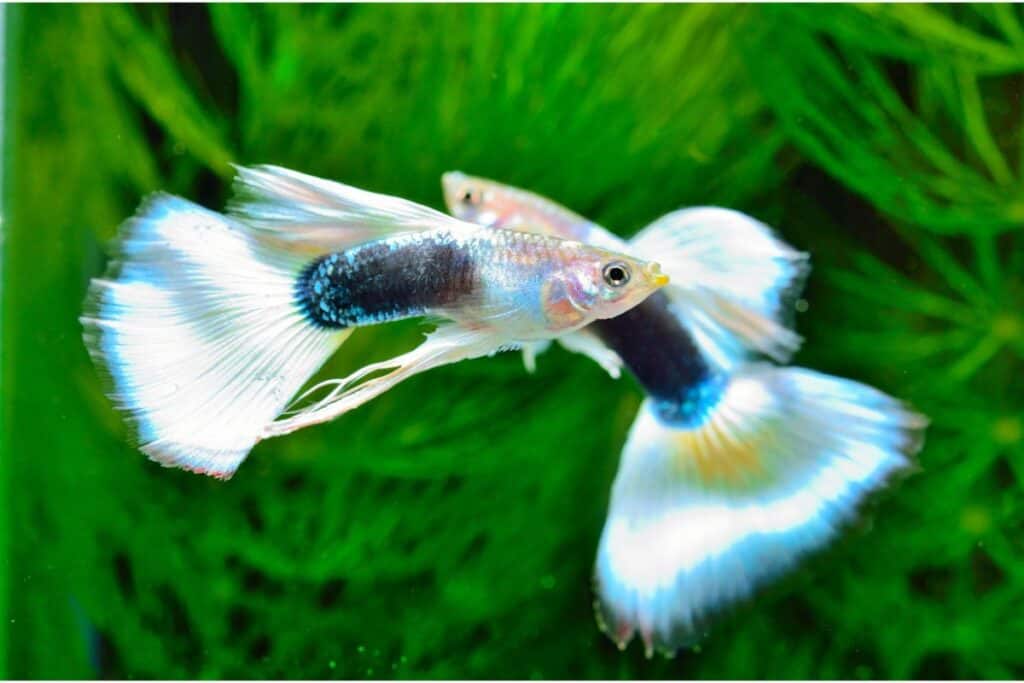You've probably experienced the frustration of having your guppies become fin nippers, but don't worry, we've got you covered! Introducing "How to prevent guppies from becoming fin nippers," a comprehensive guide that will equip you with all the knowledge and techniques you need to keep your guppies happy and peaceful. Discover the reasons behind this behavior, learn effective prevention methods, and create a harmonious tank environment that ensures your guppies' fins stay intact. Say goodbye to the stress of dealing with fin nippers and hello to a peaceful and vibrant aquarium experience!

Understanding Guppies and Fin Nipping
What are Guppies?
Guppies (Poecilia reticulata) are small, colorful freshwater fish that are popular among aquarium hobbyists. They are native to South America and can be found in various colors and patterns, making them a favorite choice for many aquarists. Guppies are known for their lively personalities and their ability to thrive in a wide range of water conditions. They are also prolific breeders, making them a great choice for those interested in breeding fish.
What is Fin Nipping?
Fin nipping refers to a behavior exhibited by some guppies, where they nip at the fins of their tank mates. This behavior can happen for various reasons, including aggression, stress, or territorial disputes. Fin nipping can cause damage to the fins of the affected fish, leaving them susceptible to infections and other health issues. It is important to address this behavior and create a suitable environment to minimize fin nipping.
Common Reasons for Fin Nipping in Guppies
There are several common reasons why guppies may engage in fin nipping behavior. These include:
-
Aggression: Male guppies, in particular, can be territorial and may nip at the fins of other fish to establish dominance or protect their territory.
-
Overcrowding: When there are too many fish in a small aquarium, it can lead to increased competition for resources, which may result in aggressive behavior and fin nipping.
-
Stress: Guppies can become stressed due to factors such as poor water quality, inadequate hiding places, or changes in their environment. Stress can trigger fin nipping as a response.
-
Lack of Food: If guppies are not provided with a varied and nutritious diet, they may engage in fin nipping behavior out of hunger or frustration.
It is important to address these underlying issues to prevent or minimize fin nipping and ensure a harmonious aquarium environment.
Creating a Suitable Aquarium Environment
Choosing the Right Tank Size
When setting up an aquarium for guppies, it is important to choose an appropriate tank size. Guppies are small fish, but they still need enough space to swim and establish territories. A general rule is to provide at least 1 gallon of water per inch of fish. For a small community of guppies, a 10-gallon tank is often sufficient, but larger tanks are recommended for larger populations or if you plan to keep other fish species with guppies.
Providing Sufficient Hiding Places
Guppies, like other fish, need sufficient hiding places in their aquarium to feel secure and reduce stress. This can be achieved by adding plants, caves, or decorations that create hiding spots and break up the line of sight within the tank. Live plants not only provide hiding places but also help in maintaining water quality by absorbing excess nutrients.
Maintaining Ideal Water Conditions
Guppies are adaptable fish, but they still require certain water conditions to thrive. The ideal water temperature for guppies is around 75-82°F (24-28°C), and the pH level should be kept between 6.8 and 7.8. Regular monitoring of water parameters and proper water conditioning through the use of dechlorinators can help ensure a stable and suitable environment for your guppies.
Keeping Aquarium Cleanliness
Maintaining a clean aquarium is crucial for the health and well-being of your guppies. Regular water changes, gravel vacuuming, and filter maintenance are necessary to remove waste, excess nutrients, and other pollutants that can accumulate in the tank. A clean environment not only reduces stress but also minimizes the risk of infections and disease, which can trigger fin nipping behavior.

Managing Aggression and Territorial Behavior
Maintaining Proper Male-to-Female Ratio
Guppies are livebearers, which means they give birth to live fry instead of laying eggs. Male guppies are known for their vibrant colors and flowing fins, which can attract the attention of both females and other males. To reduce aggression and fin nipping, it is important to maintain a proper male-to-female ratio in the aquarium. A recommended ratio is one male for every two to three females, as this can help distribute the attention and minimize territorial disputes.
Separating Aggressive Guppies
If you notice persistent aggression or fin nipping from a particular guppy, it may be necessary to separate the aggressive individual from the rest of the tank. This can be done by using a mesh divider or moving the aggressive fish to a separate quarantine tank for observation and behavior modification.
Monitoring and Removing Bullies
It is essential to monitor the behavior of your guppies regularly. If you identify a specific fish that consistently displays aggressive or fin nipping behavior, it may need to be permanently removed from the aquarium. Separating the bully can help restore peace and prevent further damage to the fins of other tank mates.
Feeding Strategies to Minimize Fin Nipping
Providing a Varied and Nutritious Diet
To prevent fin nipping caused by hunger or frustration, it is crucial to provide your guppies with a varied and nutritious diet. A staple diet of high-quality flake or pellet food supplemented with live or frozen foods, such as brine shrimp or daphnia, can help fulfill their nutritional needs. Additionally, offering occasional vegetable matter, such as blanched spinach or lettuce, can provide necessary fiber for their digestive health.
Avoiding Overfeeding
Overfeeding can lead to excess waste and poor water quality, which can cause stress for your guppies. It is important to feed your fish in appropriate amounts, considering their size and dietary requirements. Generally, it is better to feed small portions multiple times a day rather than a large quantity all at once. This way, the guppies can consume the food quickly, reducing any chances of food aggression and fin nipping.
Using Feeders or Multiple Feeding Spots
If you have a larger aquarium with multiple guppies, using feeders or scattering the food in different spots can help reduce competition for food. This can minimize the chances of aggressive behavior during feeding time and prevent fin nipping caused by resource disputes. Providing ample feeding spots encourages individual fish to feed without disruption, promoting a more peaceful environment.

Introducing Tank Mates Appropriately
Researching Compatible Fish Species
When adding tank mates to your guppy aquarium, it is essential to research and choose compatible fish species. Some fish species may have a natural tendency for fin nipping or aggression, which can be detrimental to your guppies. Look for peaceful community fish that share similar water requirements and temperament with guppies. Avoid aggressive or fin-nipping species that may disrupt the harmony within the tank.
Observing Compatibility before Adding
Before introducing new fish to the tank, it is best to observe their compatibility in a separate quarantine tank. This allows you to assess their behavior and ensures they do not exhibit any aggressive tendencies or fin nipping behavior. Through observation, you can determine if the potential tank mate is a suitable addition to your guppy community.
Quarantine Process for New Additions
To minimize the risk of introducing diseases or parasites to your existing tank, it is crucial to quarantine any new fish or plants before adding them. Quarantining provides an opportunity to monitor the health of the new additions and prevent any potential spread of infections. A separate quarantine tank with its own filtration system and regular observation can help maintain the health and well-being of your guppies.
Ensuring Adequate Space for Guppies
Avoiding Overcrowding in the Aquarium
Overcrowding can lead to increased aggression, fin nipping, and stress among guppies. It is crucial to provide enough space for each fish to swim and establish its territory. Avoid overcrowding by considering the adult size and swimming habits of your guppies. A well-planned stocking strategy and regular monitoring of fish growth can prevent overcrowding and its associated problems.
Providing Sufficient Swimming Space
Guppies are active swimmers, and they require ample space to roam and explore. Providing them with enough horizontal and vertical swimming space can help reduce stress and aggression. Avoid cluttering the aquarium with excessive decorations or large, bulky items that restrict their movement. Unobstructed swimming areas allow your guppies to exhibit their natural behavior and reduce the likelihood of fin nipping.
Avoiding Introduction of Guppies in Established Territories
Introducing new guppies to an established tank can disrupt the existing social dynamics and territorial boundaries. It is advisable to rearrange the decorations and hiding spots before adding new guppies. This helps prevent the establishment of strict territories and reduces the chances of fin nipping due to disputes over space or territory. Monitor the interactions closely to ensure a smooth integration.

Minimizing Stress and Anxiety
Maintaining Consistent Light and Noise Levels
Guppies, like many fish, are sensitive to sudden changes in light and noise. Maintaining consistent light and noise levels in the aquarium can help minimize stress and anxiety. Avoid exposing your fish to excessive or sudden brightness, as it can startle them and trigger fin nipping. Similarly, keep the aquarium in a quiet location away from loud noises, as it can contribute to their stress levels.
Avoiding Frequent Changes in Aquarium Setup
Guppies thrive in stable and familiar environments, and frequent changes to the aquarium setup can cause stress and fin nipping. Try to maintain a consistent layout and avoid moving or redecorating the tank too often. When changes are necessary, introduce them gradually and monitor the fish's behavior closely. Providing a stable and familiar environment can alleviate stress and reduce the likelihood of fin nipping.
Adding Plants and Decorations for Cover
Adding live plants, rocks, and other decorations to the aquarium can provide important cover for your guppies. These hiding places not only reduce stress but also create separation and break up line of sight, preventing fin nipping caused by aggression or territorial disputes. Plants also contribute to the overall health of the aquarium by absorbing excess nutrients and providing oxygen.
Treating and Managing Fin Nipping
Recognizing and Identifying Fin Damage
To effectively treat and manage fin nipping, it is important to recognize and identify any fin damage. Look for torn or shredded fins, visible bite marks, or frayed edges. It is essential to differentiate fin damage caused by fin nipping from other factors such as fin rot or aggression from other fish species. Understanding the specific cause of the fin damage will guide you in implementing appropriate treatment methods.
Setting Up a Quarantine Tank
If you observe significant fin damage or suspect fin nipping, setting up a quarantine tank can be beneficial. This allows you to isolate the affected fish and provide focused care and treatment. The quarantine tank should be equipped with its own filtration and heating system to maintain optimal water conditions. Regular observation and water parameter monitoring are crucial during the quarantine period.
Implementing Fin Healing Techniques
To promote the healing of damaged fins, providing a clean and conducive environment is important. Maintain optimal water conditions by ensuring appropriate temperature, pH, and water quality. Adding aquarium salt, as recommended by a veterinarian or experienced aquarist, can help combat potential infections and facilitate fin regeneration. Additionally, a balanced diet rich in vitamins and minerals can aid in the healing process.
Using Medications and Treatments
In more severe cases of fin nipping or if infections occur, medication and treatments may be necessary. Consultation with a veterinarian or an experienced aquarist is recommended to determine the appropriate course of action. Medications such as antibiotics or antifungals may be prescribed to treat infections, while commercial fin-healing products can aid in the regeneration of damaged fins. Carefully follow the instructions provided and monitor the fish's progress closely.

Monitoring and Maintaining Aquarium Conditions
Regular Water Testing and Conditioning
Regular water testing is essential to monitor the quality of your aquarium's water. Test for parameters such as ammonia, nitrite, nitrate, and pH levels on a regular basis, and take appropriate actions if any levels are out of the desired range. Use water conditioners to remove chlorine or chloramine from tap water before adding it to the aquarium. Consistent monitoring and conditioning help prevent stress and maintain the overall health of your guppies.
Monitoring Temperature and pH Levels
Keeping a close eye on the temperature and pH levels is crucial in ensuring the well-being of your guppies. Fluctuations in temperature or pH can stress the fish and potentially lead to aggressive behavior or fin nipping. Use reliable thermometers and pH test kits to regularly monitor these parameters, and make necessary adjustments if needed. Maintaining stable and suitable conditions is key to preventing fin nipping and promoting a healthy environment for your guppies.
Conducting Routine Cleaning and Maintenance
Regular cleaning and maintenance are essential for keeping your aquarium in optimal condition. Perform partial water changes every week to remove any accumulated waste and replenish the water with fresh, conditioned water. Use a gravel vacuum to remove debris from the substrate and clean or replace filter media as necessary. Routine cleaning and maintenance help maintain water quality and minimize stress on your guppies, reducing the chances of fin nipping.
Educating Yourself and Learning from Others
Researching from Reliable Sources
Education is key to successful fishkeeping, including preventing and managing fin nipping in guppies. Take the time to research and read from reliable sources such as books, reputable websites, and scientific studies. Understand the natural behavior, habitat requirements, and compatibility of guppies and their tank mates. The more knowledge you have, the better equipped you will be to create a suitable environment for your guppies and minimize fin nipping behavior.
Seeking Advice from Experienced Aquarists
Experienced aquarists can provide valuable insights and advice based on their firsthand experiences. Attend local fish club meetings, visit aquarium shops with knowledgeable staff, or join online forums where you can connect with experienced hobbyists. Ask questions, seek guidance, and learn from their expertise. Their practical tips and recommendations can help you better understand guppy behavior and effective ways to prevent or address fin nipping.
Participating in Online Forums and Communities
Engaging in online forums and communities dedicated to aquarium hobbyists can broaden your understanding and provide a platform to share experiences. Participate in discussions, ask questions, and contribute your own knowledge to help others. Online communities can be a valuable resource for troubleshooting fin nipping issues, seeking advice on specific situations, and staying updated on the latest trends and techniques in fishkeeping.
By following these comprehensive guidelines, you can create a suitable environment for your guppies, minimize fin nipping behavior, and ensure the overall health and well-being of your aquatic pets. Remember to continuously monitor and adapt your aquarium management techniques, as each tank and group of guppies may have unique needs and behavior patterns. With proper care, you can enjoy a thriving and peaceful guppy community in your home aquarium.




No comments:
Post a Comment